
Sen. Gilbert S.C. Keith-Agaran
The Ninth and final in a Series.
Editor’s note: In 2022, Leadership for the State and Maui County will be at the forefront with elections for Governor, Maui Mayor, Council, and due to reapportionment, all State Senators and State Representatives. The primary election will be held on August 13, 2022 with the General Election on November 8, 2022, and it’s not too early to start thinking about the type of State and County leaders needed. The first three months focused on potential gubernatorial candidates. The next three months focused on Maui County’s Mayor and Councilmembers. We then shifted our focus to our State legislators beginning with State Representative Troy Hashimoto, State Representative Justin Woodson and State Senator Lynn DeCoite. This month is our ninth and final in our Leadership Series and we focus on State Senator Gilbert S.C. Keith-Agaran.
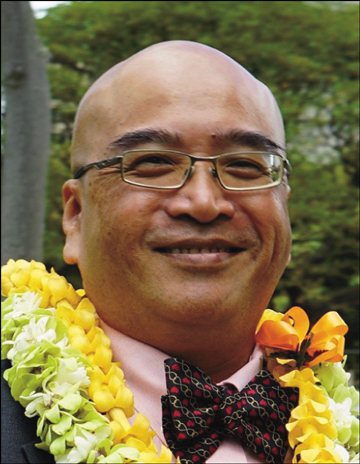
Sen. Gilbert S.C. Keith-Agaran
1. In 100 words or less, please tell us your background, including details about your family, education, and experience in the public, private, and non-profit sectors.
I’m a Maui native, Manuel and Lydia Coloma’s son but adopted by my grandparents Lino and Laureana Agaran. I attended Doris Todd and Maui High. My 1946 Sakada Dad worked as an HC&S irrigator and my Mom as a Maui Pine trimmer, both ILWU, Local142 members.
After Yale College, I earned a Cal-Berkeley law degree. I worked eight years for Governor Ben Cayetano at the Land, Commerce and Labor departments. I then served as Maui Public Works Director. I now practice law at Takitani Agaran Jorgensen & Wildman, LLLP.
I live in Kahului with my wife Kallie Keith-Agaran.
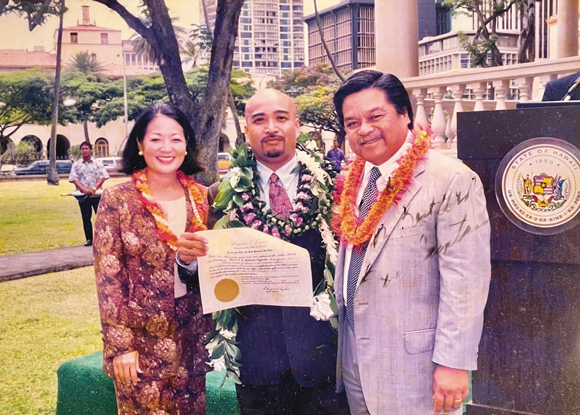
Photo courtesy Sen. Gil Keith-Agaran
2. In 200 words or less, please tell us: a) What is your vision for Maui? b) What is right with Maui? c) What is wrong with Maui?
The number of families living on the financial edge remains way too high. We need to keep chipping away at the costs of living—housing, childcare, wages and taxes—that make life challenging for residents even in good times. In this pandemic, residents who had little to no savings lost jobs (including multiple jobs) and employment-related health insurance. We need to address our quality of life by building on investments to subsidize homes for local residents and assist working families with rents and childcare. We also need to fund non-profits grants supporting services for our neediest residents.
Maintaining Maui’s health, education and welfare depends on vigorous local businesses. In the short-term, no alternative can replace the jobs provided by visitor accommodations and vendors for hotels, restaurants and activities. But we can pursue tourism better balancing impacts on our local population, infrastructure and natural areas.
Any diversification must promote self-sufficiency and developing local workforce skills. Economic investments can advance Hawai‘i’s own resiliency and sustainability in health care (training and hiring local nurses, technicians and physicians), agriculture (supporting farmers with both land and water and facilities to develop value-added products), and energy (developing, adopting, proving and marketing the technologies).
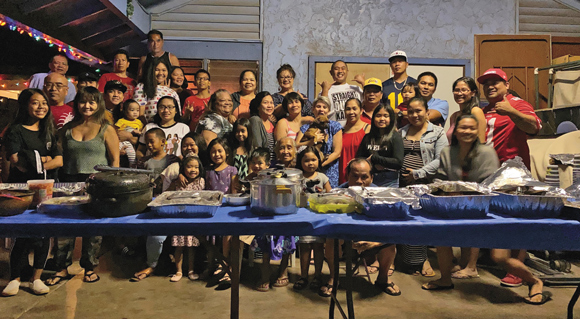
Photo courtesy Sen. Gil Keith-Agaran
3. In 125 words or less, please describe your relationship with Maui’s Filipino community.
I grew up in the local Filipino community—raised in the plantation town of Pā‘ia and later Kahului’s 12th Increment—attending with my extended family and clan, and contributing and helping at various events that celebrate, commemorate and share with our neighbors our rich culture and heritage, including Rizal Day, the Barrio Fiesta, scholarship awards and the Maui Fil-Am Heritage Festival. I am a Hawaii Filipino Lawyers Association member. I also write the Fil-Am Voice column Dinengdeng and Pinakbet, occasionally assist with other stories and articles, and previously wrote pieces for other Filipino publications on Maui and O‘ahu. I currently am the only Filipino in the Maui legislative delegation and one of eleven in the seventy-six-member Legislature.
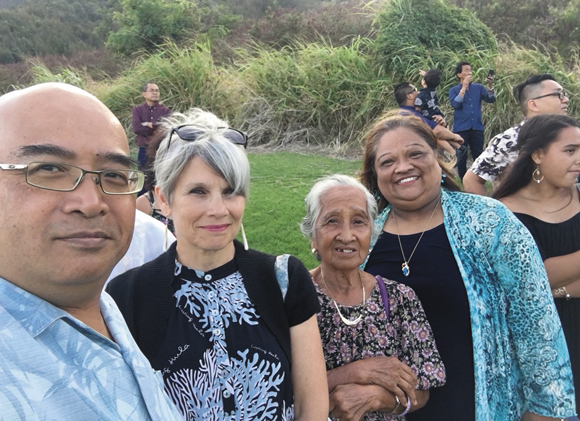
Photo courtesy Sen. Gil Keith-Agaran
4. In 500 words or less, please identify and explain the three greatest needs of Maui’s Filipino community.
Maui’s Filipino families need the same things as the rest of our community. Although my roots are firmly on Maui, I’ve lived on the east coast, the west coast, and the big city of Honolulu. My experiences shaped my thinking about both Maui’s present and Maui’s future—which I believe can be a bright one, if we act together to keep Maui the best place to live, work, play and raise our families. I love this place. I love its people. It’s why I made a conscious decision many years ago that this is where I wanted to stay.
Growing up, working and living here, I know our grandparents and our parents who worked on the plantations improved the quality of life and choices for my generation. It took hard work, education, opportunity and, yes, a selfless sense of community.
It also took courage. My grandfather and my dad came to Hawai‘i before airplanes made the journey a matter of hours rather than months on an open ocean. They came without first seeing the sand and surf on television or the internet. They came knowing only the people who disembarked on the ships with them. But at some point, they made Maui home.
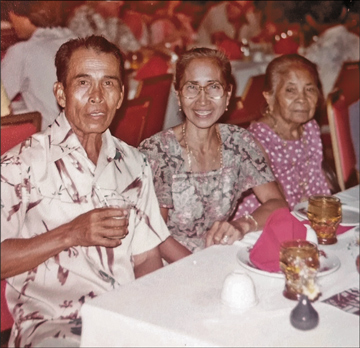
Photo courtesy Sen. Gil Keith-Agaran
Whether we were born on Maui or moved here or moved back after seeing America, we all have more economic choices today. We need to make sure government leaders understand the reality that our businesses—mainly small businesses by any measure—face to maintain profitability. Businesses need clarity on operating standards without government-imposed disruptions. Diversification can’t just be a buzzword and chasing the “next big thing.” Economic development must include building up our existing businesses, promoting self-sufficiency and local resilience.
We should invest to strengthen local skills—for example, health care. Maui Health System (MHS) now hires nurses directly from University of Hawai‘i Maui College (UHMC). The hospital also needs local medical technicians to reduce the number of off-island contractors. We can have UHMC partner with Kapi‘olani Community College. The John A. Burns School of Medicine is looking to expand medical residencies to the Valley Isle.
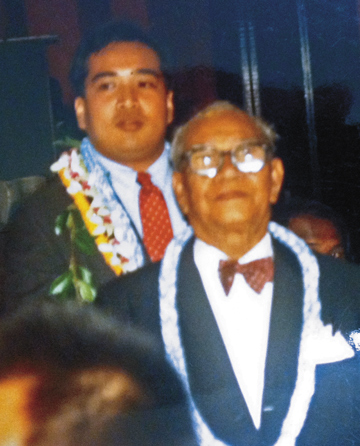
Photo courtesy Sen. Gil Keith-Agaran
It’s easy to focus your attention on challenges facing Maui from narrow, selfish viewpoints. It’s harder but you can recognize problems without being paralyzed into counterproductive and divisive argument and debate.
We place too little value in the shared connections we owe to each other. It’s useful to step back from living our individual lives in even small ways. Valuing achievement in our children and also our neighbors’ children and taking interest in their schools and activities forces us into interacting with other parents and takes us a step towards re-connecting our communities. It opens the possibility we will know the families in our neighborhood and we’ll look out for them because they look out for us. The quality of our lives and our families’ lives depends on being engaged in forming and maintaining a community that serves all of us and not just the privileged few.
